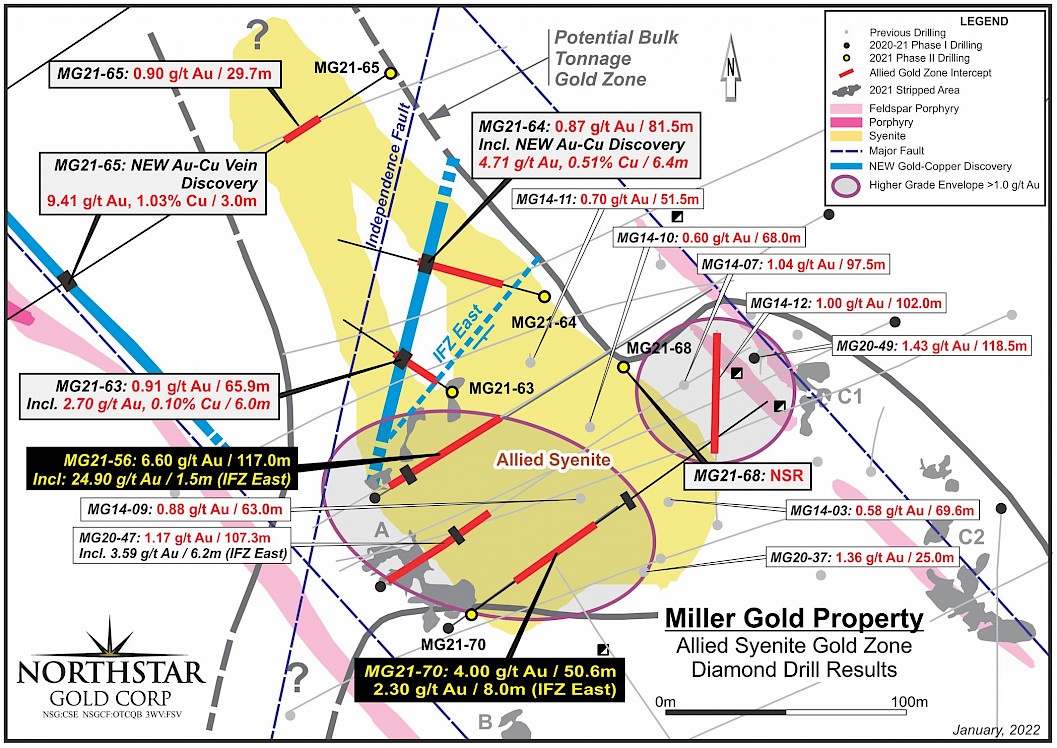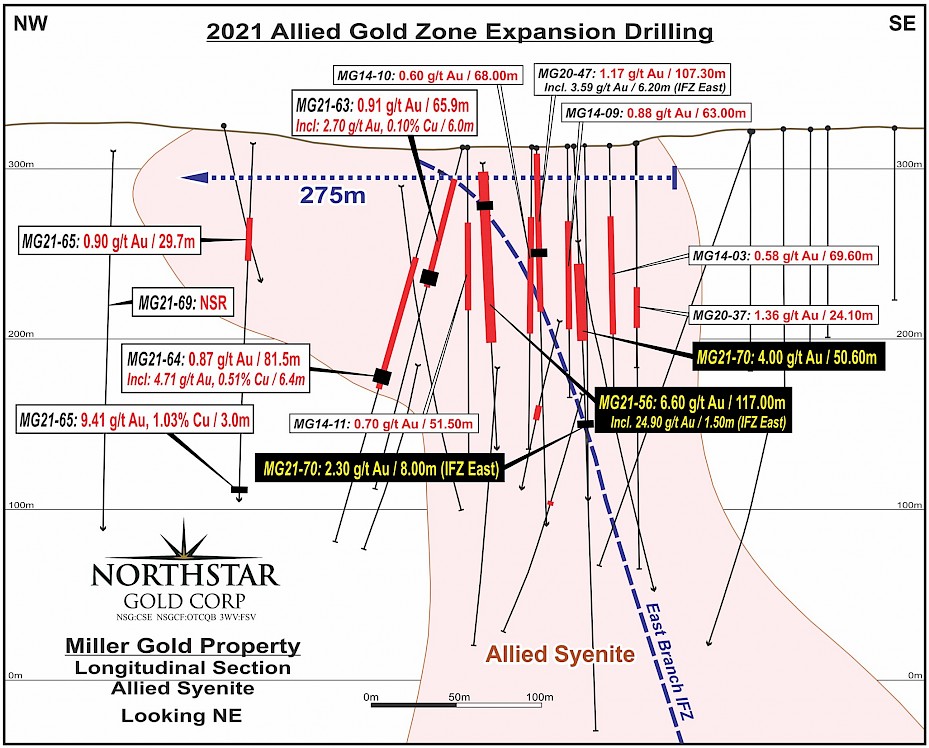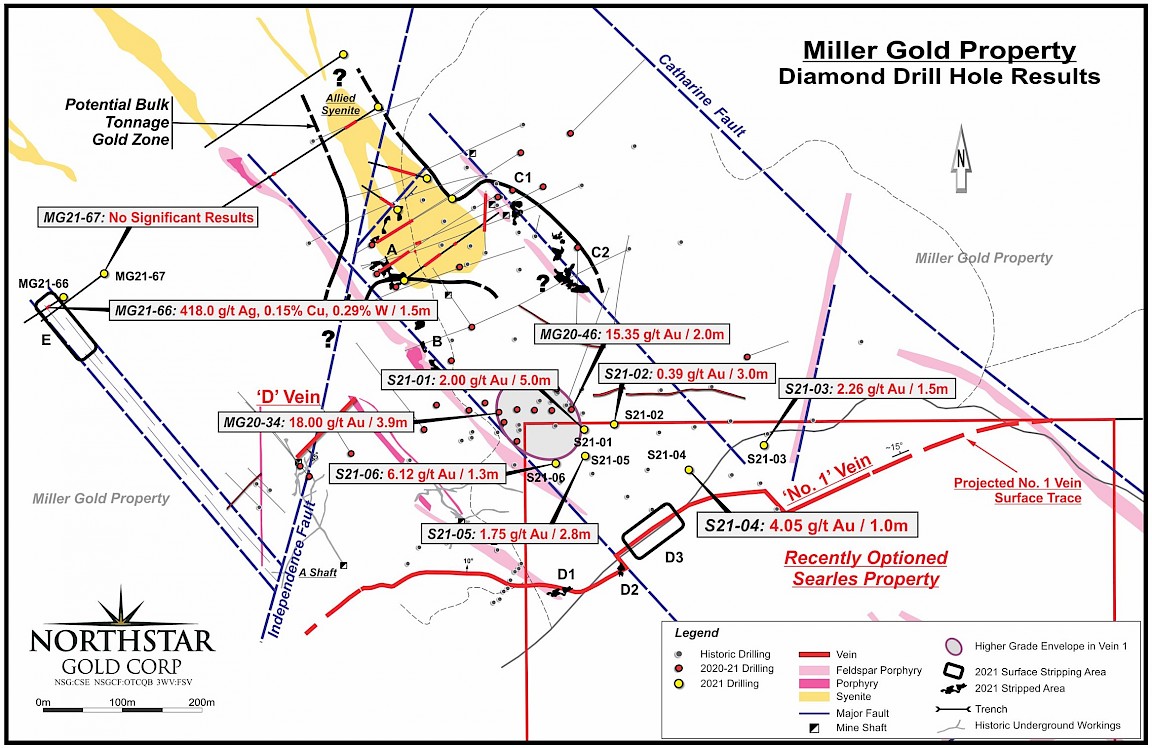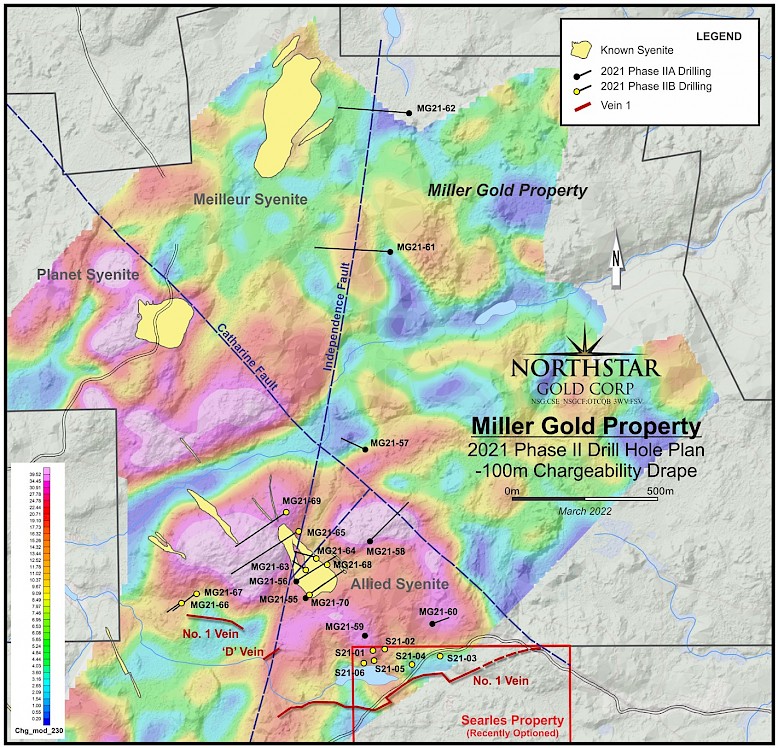Vancouver, B.C., March 15, 2022. Northstar Gold Corp. (CSE:NSG, NSGCF:OTCQB) (“Northstar” or the “Company”), is pleased to announce final results from the Company’s Phase IIB drilling exploration program on its 100%-owned Miller Gold Property, situated 18 km southeast of Kirkland Lake, Ontario.
The Phase IIB Miller Gold Property drill program was initiated on October 1, 2021 and completed on November 27th, 2021. A total of 2,495 metres was drilled in 14 holes, including 365 metres of drilling on the Searles Property in 6 holes (S21-01 to S21-06) and 315 metres of drilling in 2 holes on Area E (MG21-66 and MG21-67) – Figure 3. The remaining 1,815 metres of drilling was focused around the Allied Syenite (MG21-63, 64, 65, 68, 69, 70). Results from the first 3 of 6 Phase IIB holes drilled on the near-surface Allied Syenite Bulk Tonnage Zone (MG21-63, 64 and 65) were previously reported on January 13th, 2022. (See Northstar News Release dated January 13, 2022).
Phase IIB Allied Gold Zone Drill Results for hole MG21-70 are highlighted below:
MG21-70
- 4.0 g/t Au over 50.6 metres from 72.4m to 123m, including 7.73 g/t Au over 24 metres from 99 metres to 123 metres.
- 2.3 g/t Au over 8.0 meters from 175.5m to 183.5m, including 15.25 g/t Au over 0.8 metres from 179m to 179.8m within the Eastern Branch of the Independence Fault Zone.
Northstar President and CEO Brian Fowler, P.Geo., states, “2021 was a very busy and productive exploration year at Miller. Surface stripping identified 2 new gold discoveries adjacent and outboard of the Allied Syenite Gold Zone, extending the Zone 130m to the east and southeast. Recent drill results extended the Zone a further 180m north of 2021 drill hole MG21-56 that averaged 6.6 g/t gold over 117 metres and a further 30m south of drill hole MG20-47 that averaged 1.2 g/t Au over 107.3 metres. Exploration in 2021 more than doubled the surface Allied Syenite Gold Zone footprint with just 8 drill holes. We expect continued exploration success expanding the Allied Syenite Gold Zone and making new high-grade gold-telluride-copper vein discoveries at Miller in 2022.”
Click here to view a Proactive Canada interview with Steve Darling and Northstar CEO Brian Fowler providing further insights into this news release.
Bulk Tonnage Allied Syenite Gold Zone Expansion
The Bulk Tonnage Allied Syenite Gold Zone* has now been defined by drilling and surface sampling to encompass an area measuring 350 metres X 200 metres (Figure 1) and remains open along strike to the northwest, south and southeast.
Drill hole MG21-70, collared 35 metres southeast of hole MG21-47 (1.2 g/t Au over 107.3 metres from 4.7 metres to 112 metres) encountered anomalous pyrite mineralization between 45.5 metres and 124 metres depth with multiple quartz-chlorite breccias and occurrences of visible gold and tellurides. This includes a 24-metre-wide intercept of the Vein 1 zone from 99 metres to 123 metres depth with 0.5% to 4% chalcopyrite in blebs and stringers within a broad quartz-chlorite breccia. Numerous sub vertical fault breccias and quartz veins with visible gold and/or tellurides were intersected in the footwall of Vein 1, including the eastern branch of the Independence Fault Zone from 175.5m to 183.5m depth.
Assay results from hole MG21-70 extends the Allied Gold Zone a further 30 metres to the south and indicates the presence of a higher-grade core in the syenite over an area of at least 9,200 m2 between holes MG21-56 and MG21-70, that remains open to the northwest and south, and another, higher grade 2,800 m2 area between holes MG14-07 and MG20-49 (Figure 1). Previous drilling in the Allied Syenite intersected 6.6 g/t Au over 117.0 metres, 1.4 g/t Au over 118.5 metres, and 1.2 g/t Au over 107.3 metres within these higher-grade envelopes. The 24-metre-wide blowout in the Vein 1 Zone could potentially extend south of the Allied Syenite contact into the host metavolcanics, adjacent to the historic Allied shaft.
Results from previously reported Phase IIB drill holes (MG21-63, MG21-64 and MG21-65) targeting the Bulk Tonnage Allied Syenite Gold Zone*, confirmed a 180 metre northwest extension from previous drilling to drill hole MG21-65 (0.90 g/t Au over 29.7 metres). All 3 drill holes produced widely distributed anomalous gold grades, including occurrences of visible gold and tellurides over significant widths within the Allied Syenite.
Allied Syenite Gold Zone Surface Sampling Program – Further Expansion
During the summer and fall surface exploration program a total of 529 channel and 46 grab samples were collected and previously reported (See Northstar News Release dated January 6, 2022) from 8 stripped areas (A, B, C1, C2, D1, D2, D3, E) on the Miller and Searles Properties (Figure 3.). The best overall results were obtained in Areas C1 and C2 (14.79 g/t Au over 7.0 metres, 1.17 g/t Au over 14.0 metres) where a series of near surface, shallow dipping high grade quartz veins that tie into the larger bulk tonnage zone in the syenite were exposed, extending the Allied Syenite Gold Zone a further 130 metres to the east and southeast.
Vertical Au-Cu Structures - Possible Feeder Zones
New Allied Syenite discoveries of high-angle gold and copper rich quartz-chlorite veins and breccias at depth in holes MG21-64 (4.71 g/t Au, 0.51% Cu over 6.4 metres) within a segment of the Independence Fault Zone, MG21-65 (9.41 g/t Au, 1.03% Cu over 3.0 metres) alongside a vertical felsic dike and MG21-70 (2.30 g/t Au over 8.0m) in a branch of the Independence Fault Zone may represent structurally controlled sub-vertical feeder structures tapping a large magmatic-hydrothermal reservoir of gold-bearing fluids at depth within the Allied Deformation Zone. The host structures are open to depth and constitute excellent exploration features for follow-up in Phase III drilling.
Figure 1. Bulk Tonnage Allied Syenite Gold Zone with Phase IIB Drilling Results

IFZ East Structure
The intercept of abundant quartz-chlorite breccia in hole MG21-70 within the Eastern Branch of the Independence Fault Zone (IFZ East – Figures 1 and 2.) hosting 2.30 g/t Au over an 8 metre width from 175.5m to 183.5m suggests a zone of continuous gold mineralization within the structure from holes MG21-56 (24.9 g/t Au over 1.5 metres), MG21-47 (3.59 g/t Au over 6.2 metres) and MG21-70 (2.30 g/t Au over 8.0 metres) plunging steeply along this southeasterly dipping sub vertical structure that is expanding at depth within the Allied Syenite.
Independence Fault
Observations from drill holes MG21-63 and MG21-64 indicate the recently discovered Independence Fault is a broad sub-vertical, brittle deformation zone featuring abundant chlorite-quartz breccias with chalcopyrite mineralization and multiple occurrences of visible gold and tellurides, including an intercept of 4.71 g/t Au, 0.51% Cu over 6.4 metres from 151.1m to 157.5m in DDH MG21-64 which remains open along strike and at depth.
Drill hole MG21-65, collared near the northeast contact of the Allied Syenite, intercepted semi–massive pyrite with chalcopyrite over 3.6 metres (from 259.2 metres to 262.8 metres) grading 9.41 g/t Au, 1.03% Cu over 3.0 metres between 260m to 263m within a larger halo of magnetite alteration, proximal to a vertical feldspar porphyry dike contact. The zone is highly chargeable and can be traced for hundreds of meters along strike on magnetic and 3D IP geophysical surveys. This zone was partially sampled in Area B on surface and remains open to depth.
*The reader is reminded that the Allied Syenite Gold Zone is conceptual in nature. There has been insufficient evidence to define a mineral resource and it is uncertain if further exploration will result in the exploration target being delineated as a mineral resource.
Figure 2. Longitudinal Section of Allied Syenite Gold Zone within the Allied Syenite

Searles No. 1 Vein Drilling
A total of 365 metres of drilling was completed in 6 holes on the Searles Property in the Phase IIB drilling program. The primary objective of the program was to confirm shallow historic No.1 Vein drill intersections on the Searles Property (1987)** over a 330 metre strike length. 2014 and 2020 Northstar No. 1 Vein drill results on the adjoining Miller Gold Property include 86.60 g/t Au over 0.5 metres, 18.06 g/t Au over 3.9 metres and 15.45 g/t Au over 2.0 metres to the west. Holes S21-01 and S21-02 were twins of historic holes N-87-09 and N-87-10 respectively**. Two exploration holes (S21-05 and S21-06) were also completed 55 metres southeast and 50 metres south of the highest-grade historic intercept in N-87-08.
Below are the results from the Searles drilling program:
- S21-01 - 2 g/t Au over 5 metres from 46.5m to 51.5m.
- S21-02 - 0.39 g/t Au over 2.96 metres from 49.14m to 52.1m.
- S21-03 - 2.26 g/t Au over 1.46 metres from 35.2m to 36.66m.
- S21-04- 4.05 g/t Au over 1 metre from 21.9m to 22.9m.
- S21-05 - 1.75 g/t Au over 2.8 metres from 32m to 34.8m.
- S21-06 - 6.12 g/t Au over 1.28 metres from 29.72m to 31m.
While the 2021 Searles drill program provides evidence that the No. 1 Vein hosts anomalous gold over a very broad area along strike and down dip, drill results failed to confirm twinned historic 1987-88 assay results**. The nugget effect is very pronounced in No.1 Vein, which is enhanced for smaller less representative sample sizes such as the BQ core that was sampled in 1987. Larger samples from NQ or HQ drill core are required to mitigate the nugget effect in Vein 1.
The best gram-metre intercepts in the Searles Program came from holes S21-01 (10 gram-metres) and S21-06 (7.8 gram-metres), both located within 50m of historic drill hole N-87-08 which contained appreciable visible gold**. However, hole N-87-08 was not twinned in this program. Metallic screening is pending on all Searles holes.
There is a higher-grade zone focused on the northwestern corner of the Searles Property with dimensions of approximately 100 metres x 75 metres. Holes MG14-02, MG20-34, MG20-45, MG20-46 and historic hole N-87-08 all intersected significant gold grades within this area. It's important to note that holes S21-01 to S21-06 were outside this area.
Additional areas of interest for Vein 1 include the "D Vein" area (Figure 3.) where Vein 1 intersects the Independence Fault Zone and an area immediately southeast of stripped area C2 where there was a reported high-grade intercept in a 1928 drill hole where Vein 1 intersects a vertical northwest striking fault zone.
**Ontario Ministry of Northern Development and Mines Assessment report # OM87-6-L-239: AFRI file 32D04SW0265 "Mining and Geological Report on the 1987 Nortek Exploration Program" by Gordon B. French, President of French & Associates Inc., Highway 112, Tarzwell, Ontario.
Area E Drilling
Drilling in Area E produced results which were different from what was expected based on surface stripping, mapping and sampling observations. On surface there was a broad zone of shallow dipping quartz-carbonate veins with abundant pyrite and some chalcopyrite in the walls of the veins, hosted by a broad sub vertical shear zone and generally producing low grade gold values over appreciable widths in channel sampling such as 1.03 g/t Au over 10 metres in CH-4E.
In contrast fewer quartz veins were observed in drilling suggesting that the veins observed on surface were superficial. However, in both holes MG21-66 and MG21-67 wide intercepts of carbonate breccia along sheared contacts with gabbro dikes were observed. Abundant epidote and calcite indicated that this was host to low temperature, outboard epithermal-style mineralization.
Area E Drill Hole Results
- MG21-66 - 418 g/t Ag, 0.15% Cu and 0.29% W over 1.5 metres from 62m to 63.5m.
- MG21-67 - no significant assays
The high-grade silver assay of 418 g/t Ag (12.2 oz/T Ag) over 1.5 metres with a larger stockwork of carbonate veining was a pleasant surprise albeit an unexpected one. The only mineralization observable in the 1.5 metre sample are some sulphides including chalcopyrite in a 4 centimetre calcite vein. It's possible this vein could be hosting silver sulphosalts and/or silver sulphides.
As arsenic levels in the sample were negligible it's unlikely that the silver is temporally related to Proterozoic cobalt-silver type mineralization. Instead, it indicates a broad area of metal zonation on the Miller Property centered around the Allied Syenite intrusive complex. High grade silver tellurides have been discovered on surface as far as 900 metres to the northeast of the Allied Syenite.
Drill hole MG21-66 highlights the potential for more distal epithermal type mineralization over the entirety of the Miller Property.
Additional Allied Syenite Results
Drill hole MG21-68, collared 35 metres southeast of drill hole MG21-64 intersected syenite, feldspar porphyry and multiple breccias with pyrite and chalcopyrite mineralization near the contact with the Allied Syenite, including the Independence Fault Zone at 89 metres depth. No significant assay results were obtained, owing to the presence of a small embayment in the syenite at this location.
Drill hole MG21-69, collared an additional 80 metres northwest of hole MG21-65, encountered quartz veining and quartz-chlorite breccias with anomalous pyrite and some tellurides associated with a swarm of sub vertical syenite and feldspar porphyry dikes within the Allied Deformation Zone. Assay results from MG21-69 did confirm the presence of the vertical zone first intercepted in hole 65 (9.4 g/t Au, 1.03% Cu over 3 metres from 260m to 263m) with an intercept of 0.38 g/t Au over 4.68 metres from 290.32m to 295m. While the intercept is not ore grade it will assist Northstar in accurately modelling the geometry of the zone for follow up drilling closer to the intercept in hole 65. There was a new discovery with an intercept of 2.03 g/t Au over 1 metre from 373m to 374m within a previously untested silicified syenite dike; strongly suggesting that gold on the Property is intimately associated with alkaline magmatic fluids directly exsolved from syenite magmas.
Figure 3: Phase IIB Drilling Area including the Searles Property and Area E

Additional Phase IIA Drilling Results
Assay results are now available for the bottom half of drill hole MG21-56 and hole MG21-61.
MG21-56, collared 40m north-northeast of previous drill hole MG20-47 (1.2 g/t Au over 107.3m) intersected 6.6 g/t Au over 117 metres between 14m and 131m encompassing the Veins 1 – 4 zones with the Allied Syenite Gold Zone, including 175 g/t Au over 0.6 metres between 14m and 14.6m, 24.9 g/t Au over 1.5 metres between 43m and 44.5m, and 1,170 g/t Au over 0.5 metres between 69.5m and 70m depth in samples containing abundant visible gold and tellurides within shallow dipping quartz veins. Another zone below Vein 1 was encountered between 188m and 201m depth featuring abundant shallow dipping quartz veining with traces of tellurides that graded 1.53 g/t Au over 2 metres from 197.5m to 199.5m (Table 1). Assay results previously released between 14m and 131m (see Northstar News Release dated May 27, 2021) from drill hole MG21-56 are shown in italics in Table 1.
Drill hole MG21-61 (Figure 4.) tested a large GoldSpot AI gravity and weak IP anomaly along the projected extension of the Independence Fault Zone. Multiple tectonic breccias were observed in core between 78m and 326m all within silicified, carbonatized and hematized mafic tuff, particularly in the carbonate and hematite rich breccia zones. A mineralized Quartz-Feldspar Porphyry dike was intersected between 65m and 72m containing about 2% disseminated pyrite with quartz stringers that continued past the Quartz-Feldspar Porphyry contact to 77.5m. Between 177m and 182m a schist with pervasive silicification, sericite, carbonate and hematite alteration with ~3% fine disseminated pyrite was encountered which likely represented the weak IP anomaly. A broad zone of intensely silicified breccia was discovered between 266m and 326m representing a larger fault structure, likely a portion of the Independence Fault. All structures between 177m and 326m are believed to be striking NNE, dipping steeply to the east and likely represent the extension of the Independence Fault Zone along strike about 1km north of the Allied Syenite.
Figure 4. Phase IIA and Phase IIB 2021 Drilling Area

Table 1. Gold Assay Results from Drill Holes MG21-66 to 70, S21-01 to S21-06 , and MG21-56 and MG21-61
|
Hole No. |
Collar UTM - Zone 17 |
Azimuth (Degrees) |
Dip Angle (Degrees) |
From (m) |
To (m) |
Core Length (m) |
Silver Grade (g/t) |
Gold Grade (g/t) |
Copper Grade (%) |
Comments |
|
MG21-66 |
582301E, 5317912N |
238 |
-59 |
62 |
63.5 |
1.5 |
418 |
0 |
0.15 |
Epithermal Zone in Area E |
|
MG21-67 |
582351E, 5317942N |
231 |
-58 |
|
|
|
|
|
|
No Signifiant Results |
|
MG21-68 |
582793E, 5318037N |
0 |
-90 |
33 33.9 |
34 34.4 |
1.0 0.5 |
|
1.36 0.51 |
|
Vein 2 Zone |
|
MG21-69 |
582656E, 5318222N |
237 |
-56 |
12.5 280.01 290.32 373 |
14 281.5 295 374 |
1.5 1.49 4.68 1.0 |
|
1.53 0.68 0.38* 2.03 |
|
Vertical Zone Syenite Dike |
|
MG21-70 |
582731E, 5317937N |
55 |
-64 |
48 72.4 Incl. 72.4 75.3 82 88 93 99 Incl. 103 Incl. 106 112.5 117 120 121.5 146 170 171 175.5 Incl. 179 195.5 233 238 352.5 |
49.5 123 Incl. 73.3 76.2 83.5 89 94.5 123 Incl. 109 Incl. 107 114 118.5 121.5 123 147 171 172 183.5 Incl. 179.8 196.5 235 238.9 354 |
1.5 50.6 Incl. 0.9 0.9 1.5 1.0 1.5 24 Incl. 6 Incl. 1.0 1.5 1.5 1.5 1.5 1.0 1.0 1.0 8.0 Incl. 0.8 1.0 2.0 0.9 1.5 |
|
1.06 4.0 Incl. 2.52 0.95 0.68 6.43 2.2 7.73 Incl. 2.2 Incl. 6.12 1.03 110 1.0 2.03 1.12 1.80 0.82 2.3 Incl. 15.25 2.33 0.92* 0.78 2.24
|
0.59
2.2 |
Vein 4 Zone Allied Gold Zone “ “ “ “ “ “ “ Vein 1 Zone “ “ “ “ “ “ “ “ “
IFZ East “ “
|
|
S21-01
|
582959E, 5317745N |
0 |
-90 |
46.5 |
51.1 |
5 |
|
2.0 |
|
Vein 1 |
|
S21-02 |
582996E, 5317751N |
0 |
-90 |
49.14 |
52.1 |
2.96 |
|
0.39 |
|
Vein 1 |
|
S21-03 |
583186E, 5317725N |
0 |
-90 |
35.2 |
36.66 |
1.46 |
|
2.26 |
|
Vein 1 |
|
S21-04 |
583091E, 5317693N |
0 |
-90 |
21.9 |
22.9 |
1 |
|
4.05* |
|
Vein 1 |
|
S21-05 |
582960E, 5317711N |
0 |
-90 |
32.0 |
34.8 |
2.8 |
|
1.75 |
|
Vein 1 |
|
S21-06 |
582924E, 5317701N |
0 |
-90 |
29.72 |
31.0 |
1.28 |
|
6.12 |
|
Vein 1 |
|
MG21-56 |
582691E, 5317979N |
58 |
-59 |
14 incl. 14 25.5
43 49
63 69.5 72.3 77 93 98 106 108 115
119 incl. 119 121 122 123 124 126 129 130
170 197.5 |
131 incl. 14.6 27
44.5 50
64 70 72.8 78 94 99 107 109 115.7
131 incl. 120 122 123 124 125 127 130 131
171 199.5 |
117
0.6 1.5
1.5 1
1 0.5 0.5 1 1 1 1 1 0.7
12
1 1 1 1 1 1 1 1
1 2 |
|
6.6 175* 4.08
24.9 0.89
1.1 1,170* 1.01* 3.2 0.94 2.85 1.65 0.98 1.9
1.41
1.08 1.0 0.95 1.86 4.38 1.85 3.16 1.94
5.32 1.53* |
|
Allied Gold Zone
Vein 2 Zone “
Vein 4/IFZ East Zone “ Vein 3 Zone “ “ “
Vein 1 Zone “ “ “ “ “ “ “ “ “ |
|
MG21-61 |
583015E, 5319116N |
274 |
-45 |
75 |
76 |
1 |
|
0.39 |
|
QFP Contact |
*Visible Gold or Tellurides
Previously released results (see Northstar News Release dated May 27, 2021) from drill hole MG21-56 are shown in italics in Table 1
About the Miller Gold Property
Northstar’s flagship property is the 100% owned Miller Gold Property (“Miller”), situated 18 km southeast of Kirkland Lake and Agnico Eagle Mines’ Macassa SMC gold mine. The Miller Gold Property is highly prospective for the discovery of a large-scale, higher grade gold system similar to the deposits of the Kirkland Lake camps that produced over 24 M oz. of gold from 7 mines (Clark 2013). Geologically, Miller is believed to be a close analog to Agnico Eagle Mines’ Macassa SMC gold mine, given the numerous geological similarities. Both Miller and the newly discovered lower SMC at Macassa share the similar formation, age and minerization style (gold-telluride vein system with calaverite the main gold mineral). Both deposits are also located next to a First Order fault structure (Catharine Fault Zone at Miller Property and the Larder Break at Kirkland Lake) potentially sharing a gold enriched magmatic hydrothermal reservoir at depth.
The Miller Gold Property also hosts near-surface, lower-grade, syenite intrusive hosted bulk-tonnage mineralization (similar to Sigma/ Lamaque). Drilling to date has yielded long intercepts (50 metres to 150 metres) of near surface, lower grade (0.5 to 1.5g/t) gold mineralization at two separate known Syenite intrusions (Allied, Planet) with a 100 metre wide stockwork zone in the Meilleur Syenite yielding 2.13 g/t Au over 13.05 metres and a 147.2 metre wide intersection averaging 0.60 g/t Au at the Planet Syenite.
The Kirkland District is being explored by major and junior gold companies alike with some significant consolidation transactions recently announced and completed. Northstar spent nearly $4 million in exploration at Miller in 2020 and 2021, resulting in the expansion / discovery of four new high-grade vein structures (Vein 1, 2, 3 and 4) and the near-surface bulk-tonnage Allied Gold Zone. Northstar completed a 14 hole, 2,495 metre Phase IIB diamond drill program at Miller on November 27th, 2021, following up a previous 8 hole, 1,990 metre Phase IIA drill program completed in late April, 2021.
Northstar recently reported results from an extensive 2021 Miller Gold Property surface stripping, mapping and sampling program that further expanded the Allied Syenite Gold Zone 130 metres to the east and southeast. The Allied Syenite Gold Zone has now been defined by drilling and surface sampling to encompass an area measuring >350 metres X 200 metres and remains open along strike to the northwest and southeast. Previous drilling in the Allied Syenite intersected 6.6 g/t Au over 117.0 metres, 1.4 g/t Au over 118.5 metres, and 1.2 g/t Au over 107.3 metres.
The Company is currently awaiting metallic screen assay results from Phase IIB drill holes.
Quality Control
Samples collected in the 2021 surface exploration program and Phase IIB drilling program were delivered to ALS Global in Timmins, Ontario for preparation and assayed for gold by ALS Global in Vancouver, British Columbia.
Northstar has implemented a quality control program for its Miller Gold Property to ensure best practice in the sampling and analysis of the drill core and surface samples, which includes the insertion of blanks, duplicates, and certified standards into the sample stream. NQ sized drill core is saw cut with half of the drill core sampled at intervals based on geological criteria including lithology, visual mineralization, and alteration. The remaining half of the core is stored on-site at Earlton, Ontario.
Drill core and surface samples were submitted to ALS Global at their Timmins, Ontario facility for sample preparation where the entire sample was crushed to better than 90% passing 2mm, 1kg riffle split and pulverized to 95% passing 106 microns. Pulps are forwarded to ALS Global in Vancouver, British Columbia for analyses. Gold analyses are obtained via industry standard fire assay with ICP finish using 30 g aliquots. For samples returning greater than 10 g/t gold follow-up fire assay analysis with a gravimetric finish is completed. Based on initial fire assay gold indications as well as visual indication of mineralization and alteration, intervals are selected for re-assay by the screen metallic fire assay method. Samples are also analyzed for 48 trace and major elements by ICP-MS following a four-acid digestion. ALS Global are ISO/IEC 17025:2017 accredited (Lab No. 579) for the preparation and analyses performed on the Miller Gold samples.
Qualified Person
Trevor Boyd, PhD, P.Geo., a ‘Qualified Person’ (Q.P.) as defined under Canadian National Instrument NI 43-101, has reviewed technical aspects of this news release.
About Northstar Gold Corp
Northstar’s flagship property is the 100% owned Miller Gold Property, situated 18 km southeast of Kirkland Lake and Agnico Eagle Mines’ Macassa SMC gold mine. The Kirkland District is being explored by major and junior gold companies with recent and pending consolidation transactions. Northstar completed property wide integrated geophysics and 28 hole, 5,023 metre Phase I diamond drill programs on the Miller Property in 2020, resulting in the expansion / discovery of four new high-grade vein structures (Vein 1, 2, 3 and 4) and the near-surface bulk-tonnage Allied Gold Zone. More recently, Northstar completed a 14 hole, 2,495 metre Phase IIB diamond drill program at Miller on November 27th, 2021, following up a previous 8 hole, 1,990 metre Phase IIA drill program completed in late April, 2021. An enhanced 2021 Miller surface exploration stripping, mapping and sampling program was also completed at Miller last Fall. Collectively, 2021 surface sampling and diamond drilling more than doubled the size of the Allied Syenite Gold Zone to >350 metres X 200 metres.
Northstar has 3 additional 100%-owned exploration projects in northern Ontario, including the recently acquired 1,200 ha Rosegrove Property situated 0.5 km from the Miller Gold Property, the 4,500 ha Bryce Property, an intrusive-gold / PME VMS project located along the projected east extension of the Ridout Break, and the recently expanded Temagami-Milestone Cu-Ni-Co Property located in Strathcona Township. Northstar is advancing all 3 properties to the NI 43-101 Technical Report stage to maximize geological understanding, increase investor awareness and optimize monetization opportunities.
On behalf of the Board of Directors,
Mr. Brian P. Fowler, P.Geo.
President, CEO and Director
(604) 617-8191
bfowler@northstargoldcorp.com
Cautionary Note Regarding Forward-Looking Statements
This news release contains certain forward looking statements which involve known and unknown risks, delays, and uncertainties not under the control of Northstar Goldcorp. which may cause actual results, performance or achievements of Northstar Gold Corp to be materially different from the results, performance or expectation implied by these forward looking statements. By their nature, forward looking statements involve risk and uncertainties because they relate to events and depend on factors that will or may occur in the future. Actual results may vary depending upon exploration activities, industry production, commodity demand and pricing, currency exchange rates, and, but not limited to, general economic factors.


